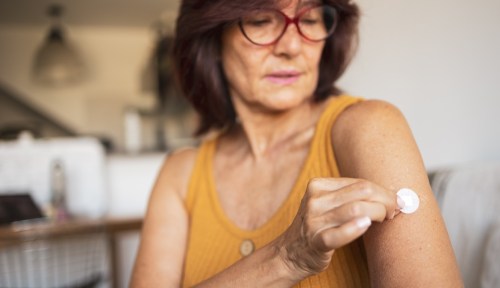Our editors independently select these products. Making a purchase through our links may earn Well+Good a commission
Outside of puberty and pregnancy, menopause is one of the biggest physical changes that people with uteruses go through. Yet there’s still a lot that’s misunderstood about it. Many people are still unsure when it starts, what the earliest signs are, and if anything can be done to make the symptoms easier to endure.
Experts in This Article
board-certified OB/GYN
Mache Seibel, MD is a women’s health and menopause treatment expert. He’s also the author of the book, The Estrogen Window.
board-certified OB/GYN and clinical professor at the Yale University School of Medicine
The Estrogen Window author Mache Seibel, MD, says a major reason why there are so many questions surrounding menopause is that we need to normalize talking about it more. “It can be hard for women to talk about because of the agism in our society,” he says, since menopause and old age are often conflated. But that’s a huge misconception. “Menopause is not about age,” he says. “You can go through menopause in your 30s or 40s, which isn’t ‘old’ by anyone’s standards.”
That’s just one myth Dr. Seibel finds himself correcting on a regular basis. Ready for more? Here, gynecologists give the straight facts about menopause, revealing the most common questions they get asked.
1. What even is menopause?
Calla Women’s Health founder and Jarrow Formulas women’s health advisor Kameelah Phillips, MD says that while most people have heard about menopause, they’re still confused about what exactly it is. “Menopause is the natural decline of the hormones estrogen, progesterone, and testosterone,” she says. Dr. Phillips says a person with a uterus is in menopause when they haven’t had their period for a full year. You can also go through menopause if you have your ovaries surgically removed (which is often a way to address or prevent ovarian cancer).
“Once you become menopausal you will remain in this stage for the rest of your life. A return of periods or any vaginal bleeding is not normal and should be evaluated by a doctor,” she adds.
2. When does menopause start?
Dr. Seibel says many of his patients are often shocked at how early menopause can start. “The typical person will go through menopause between the ages of 45 and 55, with a mean age of 51. But symptoms start up to 10 years before that,” he says. (Trans men who do not take testosterone will also go through menopause.)
“I tell patients that the normal range to be going through menopause is anywhere between 35 and 60,” says Mary Jane Minkin, MD, a North American Menopause Society certified menopause clinician and founder of Madame Ovary. “One percent of women are fully menopausal by age 40 but then on the other side of the spectrum are women who continue to get their period until they’re 60. They’re outliers, but still there,” she says.
Often, Dr. Seibel says, patients will come to him saying they’re experiencing brain fog, weight gain, or vaginal dryness not realizing that these are early menopause symptoms. “They’ll say, ‘I just had a baby! I can’t be menopausal,’ but symptoms really can start that early,” he says.
“The best guide [in terms of an educated guess of when you’ll likely start menopause] is your family history,” Dr. Minkin says. “If your mom and grandmother started going through menopause at 57, for example, you likely will too. There’s no blood test for diagnosing menopause.”
3. What are the earliest symptoms of menopause?
Part of the reason some in their 30s and 40s don’t realize they’re starting to go through menopause is because they don’t know what the earliest signs are. Besides disruptions in your menstrual cycle, moodiness, hot flashes, trouble sleeping, vaginal dryness, skin dryness, inability to lose weight, and brain fog are all classic menopause symptoms. “These symptoms are all caused by an imbalance in hormones, primarily estrogen and progesterone,” Dr. Seibel explains.
Dr. Minkin says trouble sleeping is another big one. “It’s not uncommon to be able to fall asleep, but then wake up in the middle of the night with a hot flash, then you fall back asleep and wake up a couple hours later with another one,” she says. Not being able to get a good night’s sleep can of course lead to feeling moody or experiencing brain fog the next day.
Dr. Minkin also emphasizes that different people have different experiences of going through menopause. For example, she says 20 percent of people won’t experience any symptoms at all, other than not getting their period anymore. It’s another reason why there’s so many misconceptions that surround this life stage.
4. How can I support my body as I go through menopause?
Dr. Seibel recommends the age old advice of healthy eating and exercising, both of which can go a long way to reduce menopause symptoms. Dr. Phillips recommends weight bearing exercise in particular. “This is important to maintain bone and muscle mass—both of which are important to minimize the risk of osteoporosis,” she says, which is a common struggle for menopausal women.
For those who are experiencing trouble sleeping, Dr. Minkin recommends not drinking alcohol before bed (which is never good for sleep BTW). “It may help you fall asleep, but it won’t help you stay asleep,” she says.
5. Should I consider hormone replacement therapy?
For those whose symptoms are next-level annoying, both Dr. Minkin and Dr. Seibel say hormone replacement therapy is certainly worth considering. Basically what this entails is taking medication that contains estrogen with or without progestin (a synthetic form of progesterone). “Many women believe that estrogen causes breast cancer or heart disease, but this isn’t true,” Dr. Seibel says. He explains that the reason many believe this is because of a study that came out in 2002 that suggested this. But even though the study has been widely discredited, the myth lives on. “For women who are truly suffering, there’s no reason for it when there is safe medication that can help,” Dr. Minkin says. It’s something worth talking to your doctor about if you’re struggling with symptoms.
6. What’s going on with my vagina?
If you’re experiencing some vaginal changes or discomfort, menopause could be the culprit. “Lower estrogen levels can manifest as discomfort during intercourse, vaginal dryness, and infections,” Dr. Phillips says. She often suggests patients take a probiotic with lactobacillus, which is linked to supporting vaginal health. Also, major PSA: you definitely don’t have to live with vaginal dryness. “There are several moisturizers and lubricants that you can buy over the counter at the drugstore that work really well,” Dr. Minkin says.
7. My interest in sex is completely tanking. Is there anything I can do?
You know how when you go through puberty, all the sudden sex is on your mind, like, constantly? Dr. Seibel says going through menopause is kind of like puberty in reverse, so it’s really common for interest in sex to decrease. (The other symptoms like lack of sleep, vaginal dryness, and hot flashes definitely don’t help, either.)
Dr. Phillips urges people experiencing this not to feel shy about bringing it up to their doctor because this is also a symptom that has solutions, which could include medication or working with a sex therapist. “It’s also important to talk to your partner to they can help address your emotional, physical, and psychological needs,” she says.
Going through menopause can, at times, be frustrating, but something it shouldn’t be is a guessing game. Armed with the facts about menopause make it easier to navigate because you’ll know what to expect and how to manage the symptoms better. And that’s exactly why it’s worth talking about more.
Sign Up for Our Daily Newsletter
Get all the latest in wellness, trends, food, fitness, beauty, and more delivered right to your inbox.
Got it, you've been added to our email list.











